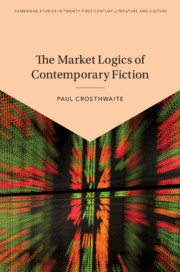Book contents
- The Market Logics of Contemporary Fiction
- Cambridge Studies in Twenty-First-Century Literature and Culture
- The Market Logics of Contemporary Fiction
- Copyright page
- Dedication
- Contents
- Acknowledgements
- Introduction
- Part I The Emergence of Market Metafiction
- Part II The Phantasmagorias of Contemporary Finance
- Chapter 2 Trading in the As If
- Chapter 3 “The Occult Logic of ‘Market Forces’”
- Part III The Market Knows
- Part IV The Moment of Market Metafiction
- Notes
- Index
Chapter 3 - “The Occult Logic of ‘Market Forces’”
Iain Sinclair’s Post-Big Bang London
from Part II - The Phantasmagorias of Contemporary Finance
Published online by Cambridge University Press: 04 July 2019
- The Market Logics of Contemporary Fiction
- Cambridge Studies in Twenty-First-Century Literature and Culture
- The Market Logics of Contemporary Fiction
- Copyright page
- Dedication
- Contents
- Acknowledgements
- Introduction
- Part I The Emergence of Market Metafiction
- Part II The Phantasmagorias of Contemporary Finance
- Chapter 2 Trading in the As If
- Chapter 3 “The Occult Logic of ‘Market Forces’”
- Part III The Market Knows
- Part IV The Moment of Market Metafiction
- Notes
- Index
Summary
This chapter argues that a logic of fiduciary exchangeability finds its most sustained and versatile expressions in the work of the celebrated London writer Iain Sinclair. Sinclair’s work of the 1990s is both a crucial signal of a deepening intimacy between experimental and genre writing that has become all the more pronounced over the past two decades, and a leading-edge example of the techniques of market metafiction so prevalent today. The chapter reads Sinclair’s novel Downriver (1991), published in the wake of the Thatcherite transformation of the City of London’s financial services sector, as exploring what happens to structures of fiduciary circulation when they are pushed to – and beyond – their limits. The reading of the ostensibly non-fictional Lights Out for the Territory (1997) as an exercise in the “hermeneutics of speculation,” meanwhile, argues for the constitutive roles of faith and belief even in texts that apparently ground themselves in the real and material, in the process challenging the homology between literary realism and precious metal that is a basic premise of much key work in the New Economic Criticism.
Keywords
- Type
- Chapter
- Information
- The Market Logics of Contemporary Fiction , pp. 92 - 126Publisher: Cambridge University PressPrint publication year: 2019

